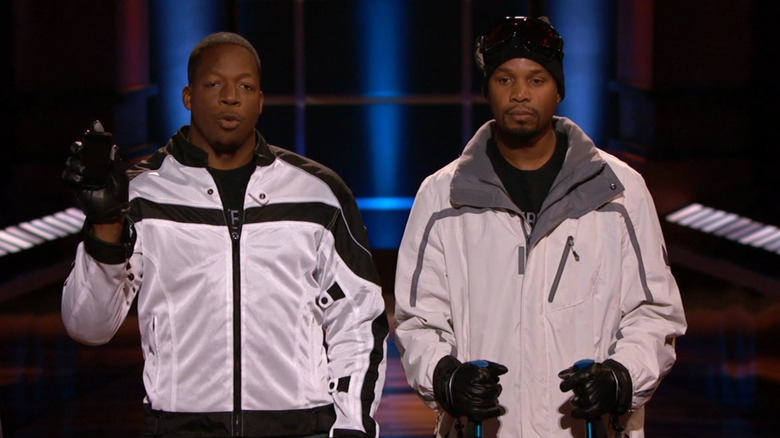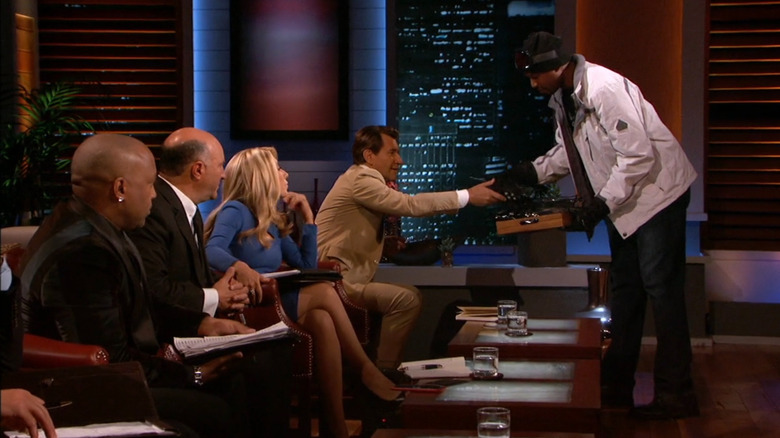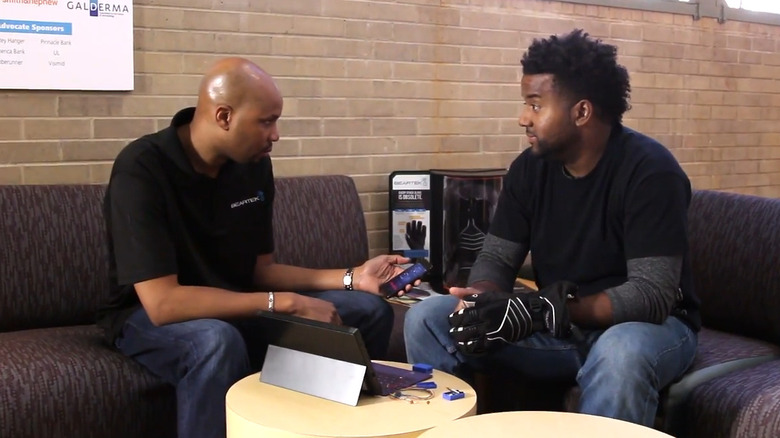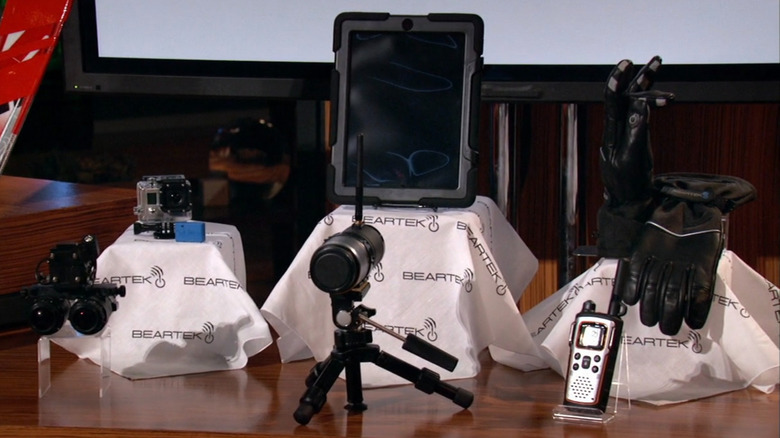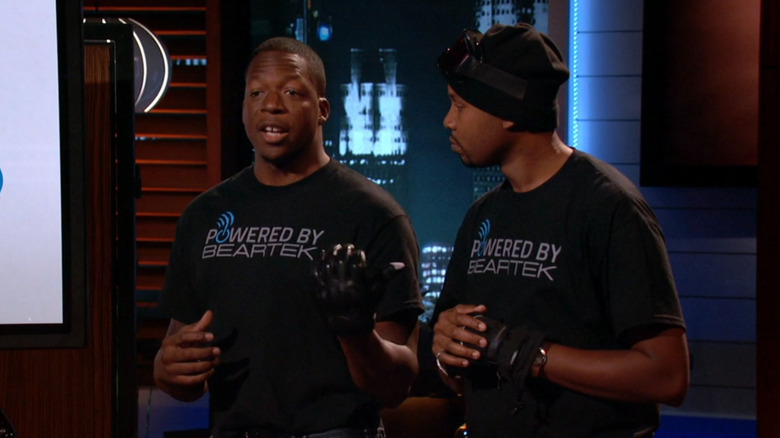What Happened To BearTek On Shark Tank Season 7?
While smartphones and other mobile devices generally make our lives easier, they can come with their own set of inconveniences. This was especially the case for entrepreneurs Willie Blount and Tarik Rodgers, who found it difficult to interact with their devices while engaging in their favorite outdoor activities, resulting in the creation of BearTek, a set of high-tech gloves that can control devices through Bluetooth.
The gloves are equipped with specialized sensors that activate when the thumb touches the corresponding finger, allowing the user to make phone calls, skip through songs, and adjust the volume, among other functions. Additionally, they can also control the recording functions of GoPro cameras. Blount and Rodgers, both cousins, are outdoor enthusiasts, with the former being an avid motorcyclist and the latter having a passion for skiing. Seeking a better way to control their devices while engaging in such intense activities, the two combined their experiences in business and technology to birth the BearTek glove. A Kickstarter campaign seeking $50,000 was launched in November 2012, but failed to hit its mark, only bringing in a little over $13,000.
This speed bump did little to slow the team's momentum, as they'd eventually make an appearance on the popular ABC reality series "Shark Tank." Appearing in the same season as other notable pitches such as the infamous Pavlok and the unique theme park Extreme Sandbox, the presentation had its fair share of strengths, but had trouble overcoming some of the skeptical Sharks.
What Happened to BearTek on Shark Tank?
Willie Blount and Tarik Rodgers entered the tank with a major ask — a $500,000 investment for 5% equity in their company, equating to a $10 million valuation. They showcased their technology to the Sharks and explained that they intend to apply the technology elsewhere, with the gloves essentially being their proof of concept.
They shared that companies they showcased the product to told them it would take two years to fully develop the technology. However, they were able to do so in only five months. A pilot product was developed, with 1500 units costing between $200 and $275 being sold within 15 months, bringing in around $20,000. While this impressed the Sharks, they hesitated after hearing that Rodgers had put $500,000 into the company. The entrepreneurs shared that they had received interest from major retailers and the military to employ their gloves for use in controlling their tech, but it did little to wane the investors' worries.
While they saw some potential with the idea, the sharks largely couldn't justify the $10 million valuation. Even though the duo explained that using the gloves provided less room for error than voice-activated products, Kevin O'Leary wasn't convinced it would make a big enough dent in the market. Mark Cuban and Daymond John both felt that the risk wasn't worth it, and Robert Herjavec failed to see how they'd transition out of the glove business. Lori Greiner thought the product and entrepreneurs had potential, but they were too early in the game.
BearTek after Shark Tank
Despite the team's enthusiasm and good intentions, BearTek sadly failed to drum up much interest from the Sharks. Nevertheless, the attention gained from their "Shark Tank" appearance would pay off.
The segment aired on February 5, 2016. While the team didn't strike a deal, they made the best out of their time in the limelight by launching an Indiegogo campaign for the new and improved BearTek Gen II, which featured an integrated phone app that allowed for advanced control options. Additionally, the team was putting together a development kit for further applications of the technology. The results of this campaign differed drastically from the disappointing turnout of the company's initial Kickstarter operation, in no small part thanks to the boost in attention from its appearance on "Shark Tank." Within the first two days, the team reached 116% of its initial goal, with $60,000 raised in around five days.
This seems to have been part of the team's motivation for going on the ABC show to begin with, with an update post reading, "Here is a sincere thank you from Team BearTek! Hopefully you saw us on 'Shark Tank' last night... Just know that the first priority on that show was always to get the 7 million+ viewers to learn about the Power of BearTek."
Why did BearTek go out of business?
As fast as BearTek rose, it suddenly disappeared, practically without a trace. On March 17, 2016, a little over a month after its "Shark Tank" episode aired, the team shared an update on its Indiegogo page that they'd be taking a hiatus to address some problems and would refund backers.
The statement reads, "It's been a long road for BearTek and we reached $60,000 in our campaign which was well above our goal! Most of that was within the first 5 days of the campaign. However, additional challenges have come up where we have to take BearTek into hibernation for a little while until we find the right partners/investors to help take this to the next level and beyond. We want to be as transparent as possible as we have been with this campaign, and true to our last 4 years of delivering a great product and making deliriously happy customers. Stay tuned as you should not be surprised to see BearTek resurface shortly stronger than ever, In the meantime, we are processing all the refunds on the campaign at this moment so no one will be charged until we are sure we can deliver as promised."
Sadly, it appears as though BearTek won't be awakening from that hibernation. The LinkedIn of co-founder Tarik Rodgers indicates he left the company in March 2016, which is right around when BearTek went dark. Its website and social media accounts are all either non-existent or haven't been updated since early 2016, indicating that the company has closed its doors.
What's next for BearTek's founders?
BearTek's sudden success and similar sporadic end are a mystery, to say the least. With the traction gained after its "Shark Tank" appearance and the promise of further innovative applications of the technology, BearTek had the potential of being the next Jamie Siminoff, another former "Shark Tank" reject who went on to bigger and better things with his ideas, but stopped before things really took off. While we'll never know what BearTek could have been, its ambitious co-founders have carved out satisfying careers elsewhere.
In addition to Willie Blount's technological expertise and entrepreneurial passions, he also worked within the House of Representatives as a Director of Information Systems, aiding in project management and technical system procedures. He has since founded two different ventures: KNX Mounts in 2017 and Next Level Gaming and Entertainment, the latter of which is still in operation as of this writing.
Tarik Rodgers, meanwhile, has gone on to reach some lofty positions at several notable companies. These include being Vice President of Operations at Skin Specialists of Allen/Addison, Program Group Manager at Citigroup Bank, and CEO of medical transport provider Level 4 Transit.
